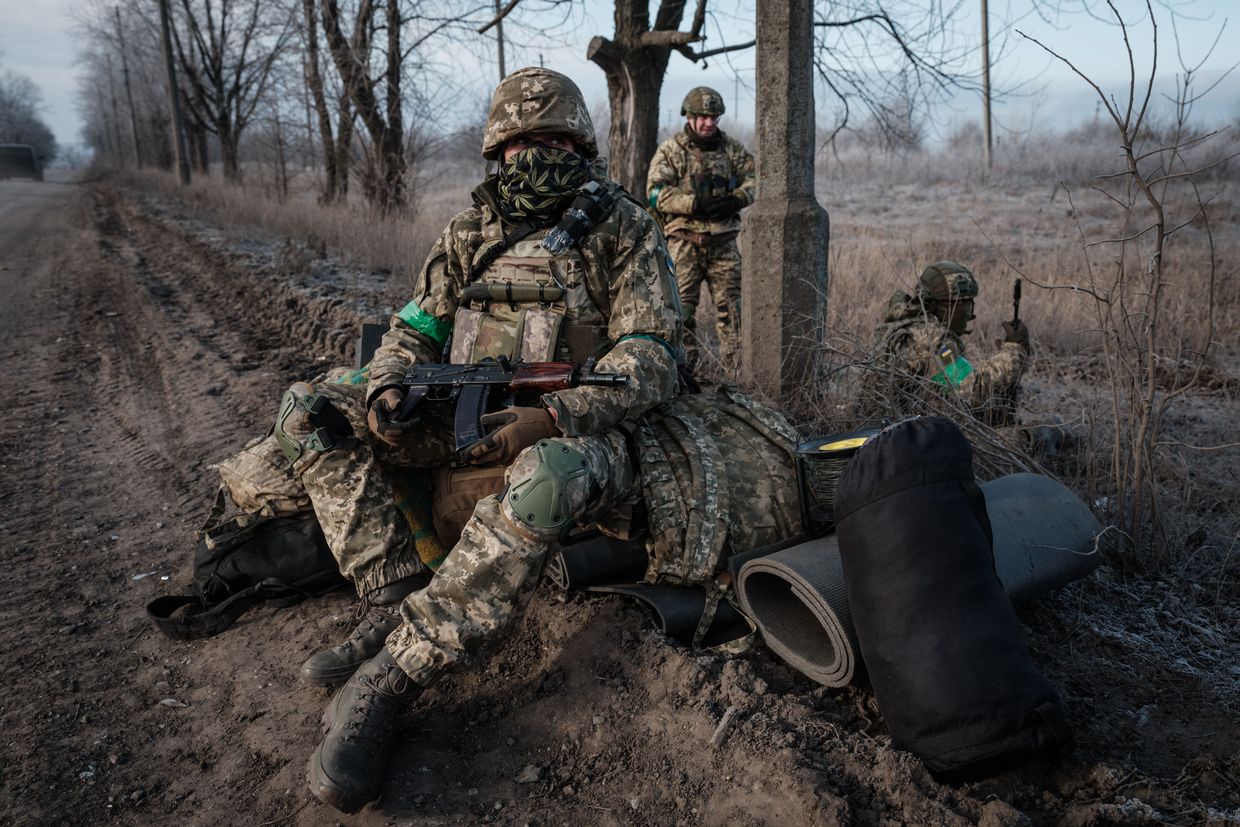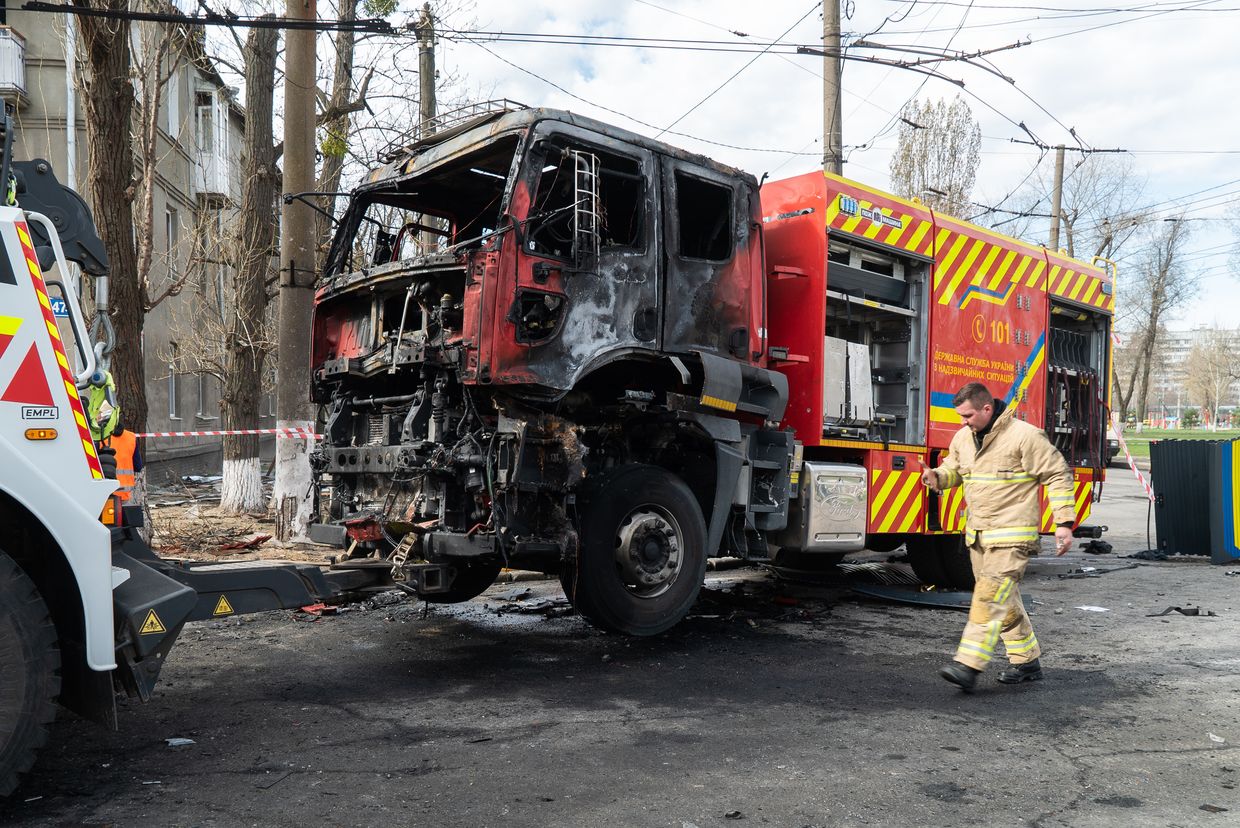Ukraine war latest: Russian attack on Chernihiv kills 17, Johnson sets date on Ukraine aid vote

Key developments on April 17:
- Russian missile attack on Chernihiv kills at least 17, injures 60, including children
- Johnson says vote on Ukraine, Israel foreign aid bills to take place on April 20
- Sources: HUR confirms attack on Russian bomber factory in Tatarstan
- Kharkiv at risk of becoming 'second Aleppo,' mayor says
- NATO-Ukraine Council meeting on air defense to take place on April 19
Russian forces launched a missile attack on the city of Chernihiv on the morning of April 17, killing at least 17 people and injuring 60, including three children, the State Emergency Service reported.
Two of the victims died later in the hospital, the service said.
Explosions were heard in Chernihiv, located in Ukraine's north, at around 9 a.m. local time, according to the Suspline media outlet.
A 25-year-old female police lieutenant is among the killed, said Interior Minister Ihor Klymenko. She was at home on sick leave when shrapnel fatally wounded her, according to Interior Minister Ihor Klymenko.
"This would not have happened if Ukraine had received enough air defense equipment and if the world's determination to counter Russian terror was also sufficient," President Volodymyr Zelensky said on Telegram.
Three Russian missiles hit an area near the city's downtown, according to Chernihiv Oblast Governor Viacheslav Chaus. Civilian and social infrastructure facilities came under attack, Oleksandr Lomako, the city's acting mayor, said.
An eight-story building was destroyed in the attack, while four high-rise buildings, a hospital, a higher education institution, and dozens of cars were damaged, according to Oleksii Kuleba, a deputy head of Ukraine's Presidential Office.
At least three people were still considered missing as of 11 a.m. local time, according to Klymenko.
"Terrorists can destroy lives only when they first manage to intimidate those who are capable of stopping terror and protecting life. Determination matters. Support matters," added the president.
"Ukrainian determination is enough. There needs to be sufficient commitment from partners and sufficient support to reflect it."
Stocks of air defense in Ukraine are low across the country as U.S. military aid funding for Ukraine continues to be held up in Congress. In the meantime, Russia has stepped up targeted attacks on Ukraine's energy infrastructure, overwhelming local air defenses and destroying some of Ukraine's largest coal-fired power stations.
Johnson says vote on Ukraine, Israel foreign aid bills to take place on April 20
U.S. House Speaker Mike Johnson said he is moving forward with his plan to hold a vote on a series of foreign aid bills for Israel, Ukraine, and Taiwan despite pressure from Republican hardliners, CNN reported on April 17.
Johnson told U.S. lawmakers that the vote will be held in the evening of April 20.
U.S. assistance for Ukraine has been effectively blocked for months, leading to a rapidly deteriorating situation on the battlefield.
While the Senate passed a $95 billion foreign aid bill for Ukraine, Israel, and Taiwan in February, Johnson previously said he instead plans to hold a vote on four separate bills in his chamber this week.
This has sparked backlash from the right flank of the Republican Party, with lawmaker Marjorie Taylor Greene threatening to trigger a motion to remove Johnson from his position.
Thomas Massie, another Republican Congressman, said he would support the speaker's removal if Greene activates the resolution.
Other Republicans have insisted that any foreign aid bill must include measures strengthening security at the U.S.-Mexican border. This means that Johnson will likely need Democratic votes to pass the bills.
The content of the Ukraine aid bill was published on the House of Representatives website later on April 17. Similarly to the Senate's bill, it allocates around $61 billion in assistance for Kyiv.
Of this sum, $28 billion is allocated to defense-related "operation and maintenance" expenses for Kyiv, including $13.8 billion for new contracts under the Ukraine Security Assistance Initiative and $13.4 billion for replacement or repair of sent or used equipment.
An additional sum of roughly $1.6 billion is to remain available for Ukraine or other partners until September 2025.
If the House passes the aid in this form, the bills will have to travel back to the Senate for an additional vote before being sent to U.S. President Joe Biden for signature.
U.S. President Joe Biden said on April 17 that he "strongly supports" House Speaker Mike Johnson's proposals on foreign aid for Ukraine, Israel, and other partners.
"I strongly support this package to get critical support to Israel and Ukraine, provide desperately needed humanitarian aid to Palestinians in Gaza, and bolster security and stability in the Indo-Pacific," the statement on the White House's website read.
"The House must pass the package this week and the Senate should quickly follow. I will sign this into law immediately to send a message to the world: We stand with our friends, and we won’t let Iran or Russia succeed."
Sources: HUR confirms attack on Russian bomber factory in Tatarstan
A factory in Russia's Tatarstan producing bomber aircraft for the Russian military was attacked by Ukrainian drones on the morning of April 17, Kyiv’s military intelligence (HUR) has confirmed.
A military intelligence source told the Kyiv Independent there were no details at present on damage or casualties but claimed the facility manufactures Tu-22M and Tu-160M bombers, both of which are regularly used to target Ukrainian cities in mass missile strikes.
Earlier on April 17, the Russian Defense Ministry claimed two Ukrainian drones had been downed over the republics of Mordovia and Tatarstan.
Tatarstan is a Russian republic located around 700 kilometers east of Moscow and some 1,300 kilometers from the Ukrainian border.
Russia's Federal Air Transport Agency said that restrictions had been imposed on the departure and arrival of planes at the airports of Nizhny Novgorod, Kazan, and Nizhnekamsk from around 7-8 a.m. local time "to ensure the safety of civilian aircraft."
Tatarstan was also targeted by Ukrainian drones on April 2 when facilities reportedly manufacturing Shahed-type attack drones were hit in the cities of Yelabuga and Nizhnekamsk.
Kharkiv at risk of becoming 'second Aleppo,' mayor says
Kharkiv Mayor Ihor Terekhov believes his city is at risk of becoming "a second Aleppo" if left without help to obtain air defense systems, according to an article published by the Guardian on April 17.
Russia recently intensified attacks against Kharkiv, which had a population of 1.4 million in 2021, with the use of missiles, glide bombs, and drones, destroying energy infrastructure and killing civilians.
Terekhov said the U.S. Congress needs to pass the delayed $60 billion Ukraine aid package to ensure new supplies of air defense and "to prevent Kharkiv being a second Aleppo," referring to the city in Syria that was devastated by fighting during the war in the country.
The cost of rebuilding everything destroyed or damaged in the city has already reached more than $10 billion, Terekhov said earlier in April.
Western officials believe that while Russia lacks the capability to launch a fresh offensive on Kharkiv, Moscow is making a "coordinated effort to cut off supplies and create conditions that make the city uninhabitable, Bloomberg reported on April 16.
Bloomberg's report echoed Terekhov's remarks to The Economist that Russia aims to make the city uninhabitable for civilians.
At the end of March, Russia destroyed all the electrical substations in Kharkiv, leaving Ukraine's second-largest city without a stable power supply.
While Kharkiv is at particular risk because of its proximity to Russia, lying less than 30 kilometers from the border, stocks of air defense are low across Ukraine.
President Volodymyr Zelensky confirmed on April 16 that Russia managed to destroy the Trypillia Thermal Power Plant in Kyiv Oblast in a missile strike on April 11 because Ukraine had run out of missiles for its defense.
NATO-Ukraine Council meeting on air defense to take place on April 19
A NATO-Ukraine Council meeting to discuss supplies of air defense systems will take place on April 19, NATO Secretary General Jens Stoltenberg said on April 17.
President Volodymyr Zelensky requested the gathering earlier this week. Russia's intensifying aerial attacks on Ukrainian cities continue to highlight the growing shortage of sufficient air defense systems.
A Russian missile attack on the city of Chernihiv on the morning of April 17 killed at least 17 people.
Stoltenberg said when NATO members are faced with the choice between keeping hold of their air defense systems or sending them to Kyiv, they "must choose Ukraine."
Iran's massive drone and missile attack on Israel at the weekend has raised questions in Kyiv about the differences in how NATO countries help defend the skies of Israel and Ukraine.
"Although the 'Shahed' drones and ballistic missiles are the same… Different threats of escalation. But are human lives different, are people's values different?" Zelensky said on April 16.
"No, they are not. We value every life equally. We must do so. We must protect them from terror on the same level."
Elsewhere on April 17, Germany launched a new initiative to secure more critically needed air defenses for Ukraine, the Tagesschau outlet reported, citing spokespeople of Germany's defense and foreign ministries.
According to Zelensky, Ukraine needs 25 Patriots to protect the entire country from Russian attacks, but Foreign Minister Dmytro Kuleba said he is for now focused on securing seven to protect Ukraine's largest cities.
Russia's recent strikes against Ukraine's energy infrastructure destroyed several thermal power plants across the country, including the Trypillia plant, the main electricity supplier to Kyiv, Zhytomyr, and Cherkasy oblasts.
Kyiv has ramped up its calls on allies to provide Ukraine with more air defenses, in particular with U.S.-made Patriot systems that can intercept ballistic missiles.
















